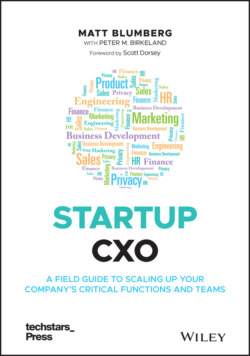Читать книгу Startup CXO - Matt Blumberg - Страница 32
Chapter 16 Strategic Finance
ОглавлениеIn the early days of a startup, your role as CFO is mostly about establishing the systems I've outlined in Chapters 12–14, finding the right partner for bookkeeping, and making sure everyone is getting paid, and has some benefits. That's a tall order for anyone, but those are the basic things that you'll have to set up if you don't want to be a blocker in your company's growth. Once revenue starts, you'll have to add more services and functions, things like billing, collections, sales taxes, and other back office and foundational items. If you just do that—build the basics, hire for roles within that structure, and add functions as you need them, you'll create a capable finance organization. But you won't create a great finance organization, you won't be able to improve productivity or make a big impact in the company. To create a great company, you'll need to think strategically about how Finance can be a partner to the organization.
For example, here's something I wish we had done from the very beginning at Return Path: develop consistent naming for products. Sounds like a little thing. And as a startup, it is simple because you might only have a couple of products. But the number of products grows rapidly and if you don't set up your systems for automation and scalable data classification, and link those to your accounting system, you'll run into problems as you grow. Product and Sales team members love (for good reason) to create new packages and products and try and invoice them as one basic price. Often Finance will either just accept whatever Sales or Product tells them OR they will go to the other end of the spectrum and create a roadblock or friction on making the changes. Instead, the best thing Finance could do is work with Product and Sales early to create a product code nomenclature that can scale as new products are added and that can be useful and scalable in your accounting systems, too. The mindset shouldn't be “No” or “Do whatever you want,” it should be “Let's figure out a solution so we both get what we need to grow the business.” The business will have much better reporting 12 months from now if the product naming follows almost an algorithmic nomenclature rather than following the naming whims of a Head of Sales or CEO.
In one early stage company we had well over 100 product “names” with active revenue attached to each. While that by itself may not technically be bad, there was no logic or grouping, and it was nearly impossible for a new hire to make sense of any of it. To create useful reporting by product, we had to manually create a table organizing these product names in a way that made sense, and it was always a bit tenuous as new names were created. Compare this to a naming system where, depending on what part of the product code you looked at, you could quickly understand revenue on a number of dimensions like region, service level, or high‐level product name. This is just one example of where Finance has a unique view (in this case, corporate reporting) that will be useful to another function (in this case, Product) while they are doing something core to their world.
In a startup there are many areas where the CFO will be able to add a lot of value as a partner, and I've highlighted a few important contributions the CFO can make to each functional area. Overall, the key is to think of Finance as an enabler of better decision making using data and analysis.
